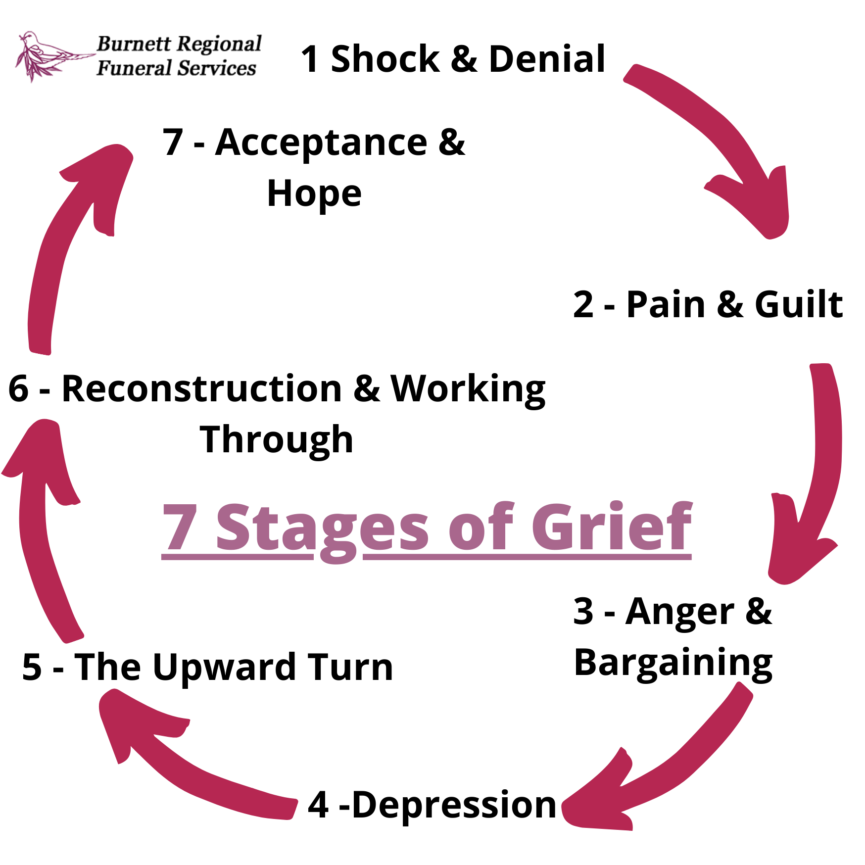Grief isn’t just about death. We grieve many things – the loss of a loved one, the death of a pet, relationship breakdowns and divorce, imprisonment, injury or illness, losing a job… the list goes on. In fact, the Holmes-Rahe Stress Scale details 43 life events that can cause us to grieve. Knowing what are the 7 stages of grief is useful, because everyone goes through periods of grief in life. Having an awareness of the 7 stages of grief won’t stop you from grieving in a stressful situation, but seeing as the way we grieve might not always feel like it makes sense, it might help you to understand where you’re at, and why. We all experience grief differently – you might feel scared, angry, you may cry, or you might feel none of these. While grief isn’t linear, there generally is a pattern to the process of grieving. To begin with we need to know exactly what grief is. According to the Grief Recovery Method, “Grief is the conflicting feelings caused by the end of or change in a familiar pattern of behavior.” Remember, if you’re grieving, it’s okay to feel what you are feeling, and it’s okay to reach out for help and support if you feel like you need it. You’re not alone. Scroll to the bottom of this articles for a list of places that can help you. Shock and denial This is the beginning of the grieving process. Something lifechanging has happened, be it the death of a loved, a divorce, foreclosure on your home, a change in health or something else. You might feel numb and struggle to believe what has happened. Pain and guilt This is where you might feel like the loss or change is unbearable. You might feel guilty about what has happened, or because you feel that you are a burden to others at this time. Anger and bargaining At this point you might feel angry, and lash out or have outbursts of anger. You might also bargain with god or another higher power that if they just rectify the situation, you will do anything they ask, you are desperate for them to relieve the feelings you are experiencing. Depression This can often present as a period of reflection and withdrawal. You may feel lonely and isolated. Remember, you are not alone and it’s okay to ask for help. The upward turn You may feel that you are in a calmer and more relaxed state as the feelings of pain and anger start to subside. Reconstruction and working through At this point, you will start to feel like you can begin to put the pieces of your life back together and move forward. That isn’t to say you won’t still experience moments of sadness, but you feel you can now start to put one foot in front of the other and look ahead. Acceptance and hope Acceptance is a long process, we won’t lie. There is a very gradual … Read More
Dealing with anticipatory grief
What is anticipatory grief? We all dread getting the heartbreaking news that someone we love is terminally ill. Did you know that grief over the loss of the person with the terminal diagnosis often starts as soon as we get the bad news? Most people are familiar with the term grief and what it means, but many of us have never heard of anticipatory grief. Anticipatory grief is mourning a loss of something before it is gone. Chances are, even if you’ve never heard of anticipatory grief that you’ve experienced yourself if you’ve known the loss of someone you love was imminent. Anticipatory grief doesn’t just apply to situations involving a terminal illness such as cancer. You can also experience anticipatory grief when a loved one has an illness that changes their personality, such as Dementia. Not everyone experiences anticipatory grief, but if you do it’s important that you talk to someone to help you deal with it. What causes anticipatory grief? Anticipatory grief can come about for several reasons, and it may not always be the loss of your loved one’s life that you are mourning, at least in the beginning. When someone you love experiences a life changing or terminal illness, life changes for everyone around them. It may be that you are mourning for the life you had “before”, especially if you have become that person’s carer. It is natural to miss what was and for wish to things to go back to how they were if life has changed dramatically. You may feel that you have lost your sense of freedom and that you are burdened with the extra responsibility of caring for your ill loved one, and this in turn may bring feelings of guilt. However, feeling like this is a very normal response to such a big change to your life. Healthdirect.gov.au also states that you might grieve for the memories you share with your loved one, particularly as they lose their independence, their memory, and their ability to recognise you. You may grieve for future plans that will never happen and experience intense and conflicting emotions. Symptoms of anticipatory grief If you are dealing with anticipatory grief, it is likely that you are experiencing a wide range of emotions about the impending loss of the person you love, or, in the case of a permanently personality changing illness, the loss of the person as you know them before they are truly gone. You may feel anger, fear, resentment, guilt, dread, powerlessness and anxiety even though the person is still alive. Writer Angie Drakulich shares her experience with anticipatory grief for her father in an article published on the website Psycom. She writes, “[These thoughts and memories] invade my mind as I try to fall asleep and they are the first images that appear when the alarm sounds. They cloud my vision as I drive from home, to work, to the grocery store, and they emerge through tears as I try to get away … Read More


